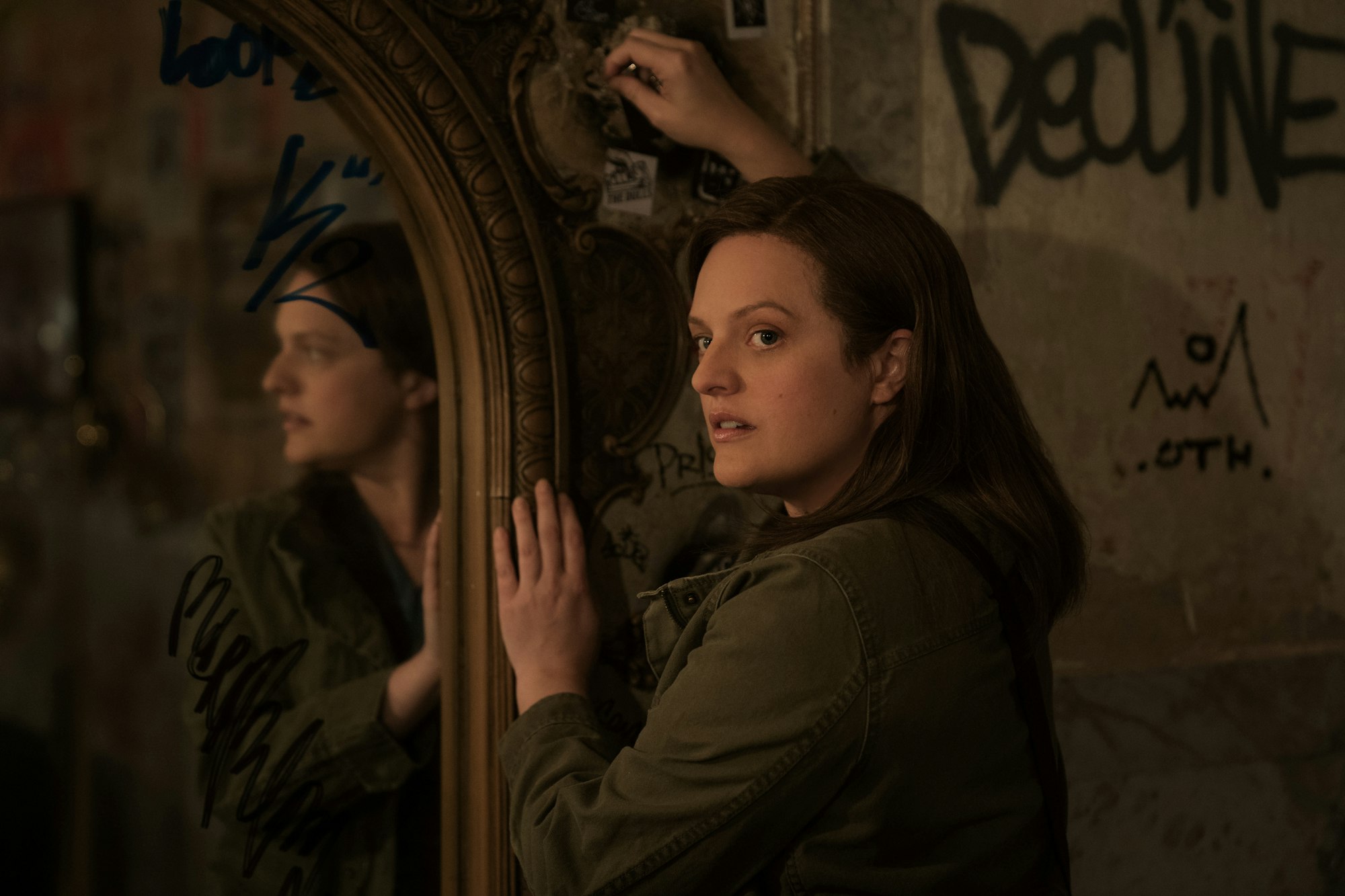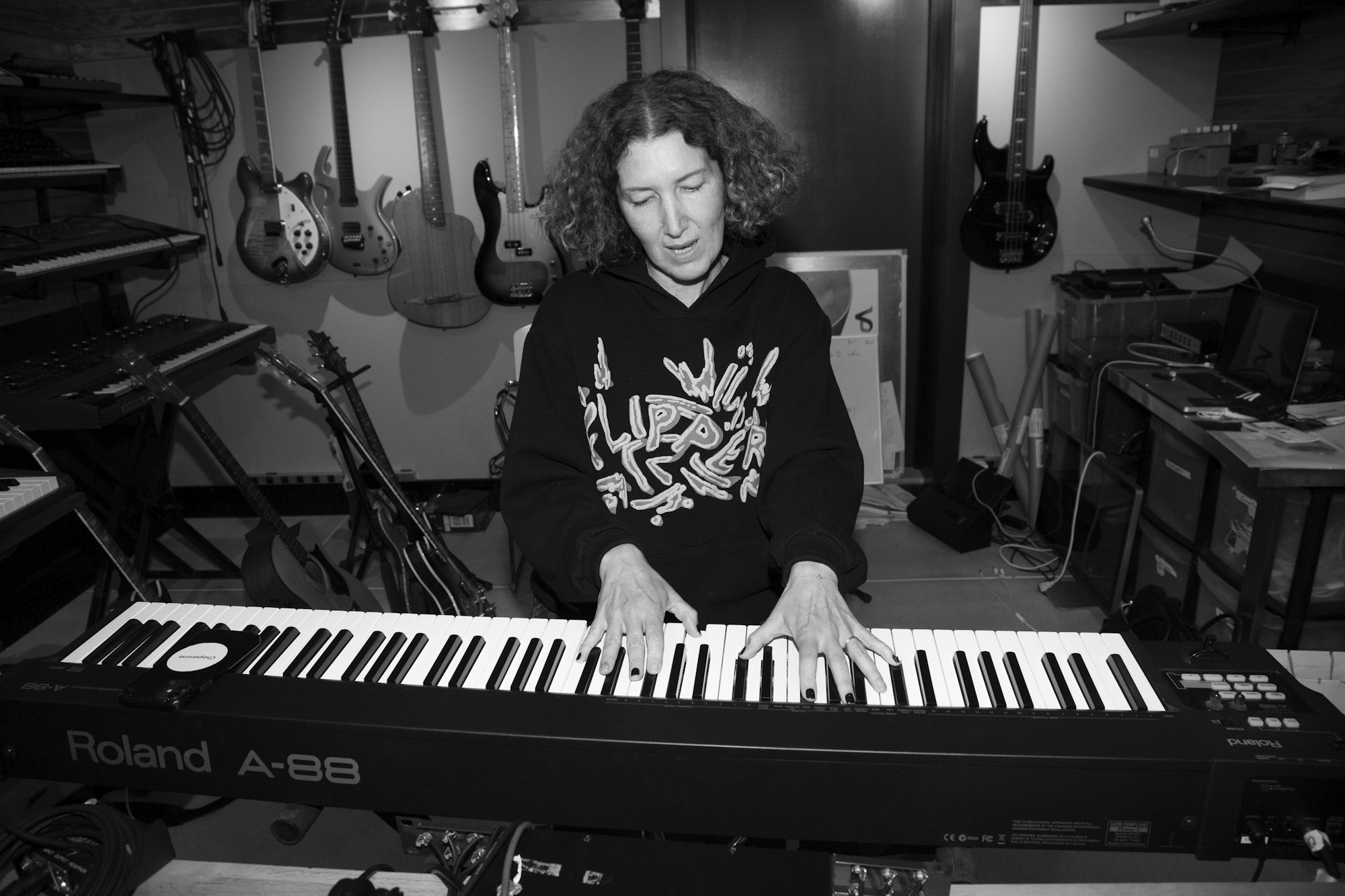Words by Tina Edwards
“What drew me to Shining Girls was the team around it and the quality of the show - the writing is great and the acting is phenomenal”, says Claudia Sarne, who scored Apple TV+’s new crime thriller production. “The series is about female violence and male superiority and I’m not gonna lie, that did attract me to it."
Sarne greets me on a weekday morning over Zoom. She’s dressed in black and well-spoken. She’s sitting in a bright, airy room dotted with plants - and her head is in her hands. Sarne tells me she has a fever but insists that we go ahead with the interview - a signifier of her hardcore work ethic.
I ask Sarne if she gives interviews often; in preparing for our conversation, I found very little evidence of interviews that she’d given before. Is she one of those rare, shy musicians? “I'm married to someone who's really successful and famous, and I kind of became a bit more anonymous. I don't get asked to dance that often - so thank you for asking me to dance”, says Sarne, smiling.

Award-winning actress Elisabeth Moss (The Handmaid's Tale, Mad Men) stars in Shining Girls as Kirby Mazrachi, the survivor of a brutal attack. Kirby teams up with a veteran reporter after she learns of a recent murder that carries parallels with her own traumatic past. All the while, she must battle through her disorientating, shifting reality. Sarne soundtracks the series with a dark and brooding score - one that delicately accents the tension, without bamboozling the actor’s performances. “Elisabeth Moss is a major craftsperson; what she does is always exceptional,” says Sarne. “I'm amazed by actors and their ability to sort of do the mercurial thing”.
Based between London and Los Angeles, Sarne is a musician, songwriter and composer who began her career singing and writing songs for her band 12 Rounds, alongside her husband Atticus Ross (also of Nine Inch Nails) and his brother, Leopold Ross. Together they released two albums and an EP, working with Nothing/Interscope Records, and shared a line-up with Placebo, Primal Scream and Rage Against The Machine at Reading Festival in 1996. Sarne moved to scoring in 2004.
I’m a feast or famine musician - everything is either mind-blowingly good or the worse fucking thing.
The productions that Sarne has written for are many and varied across TV and film, working with the likes of Allen Hughes (Touching Evil, New York I Love You, Book of Eli, Broken City, The Defiant Ones) and John Hillcoat (Triple 9, Corazon). On the likes of AMC’s Dispatches From Elsewhere (2020) and Netflix film Earthquake Bird (2019), Sarne teamed up with her former 12 Rounds bandmates, the Ross brothers. A serial collaborator, Sarne thrives on honing and shaping ideas with fellow creatives.
“I’m a feast or famine musician - everything is either mind-blowingly good or the worse fucking thing, so at some point, you need someone to bounce off of”, exclaims Sarne. “When you’re very involved in something, you can't step away from it enough times to look at it as a whole.” Such depth of focus meant that Sarne strongly valued the input of the Shining Girls team -, particularly the directors.
“The women that directed this series - [Michelle MacLaren, Daina Reid and Elisabeth Moss] - are just phenomenal. Michelle gave me a lot of license, she really trusted me”, says Sarne. “I think they were scared because the tone of what I was doing was explicit, and I think that they were wanting the actors to carry the weight of anything that was dramatic. The idea of music that was moody and sombre and expressive… it was too much for them [at first] but I think they came around to it; it just took a minute - we arrived in our happy place”.
Sarne began preparing the Shining Girls soundtrack with the scripts and a lookbook. “I just started writing freely and then last Summer I gave them about two hours worth of music”, says Sarne, reflecting on the process from her British home in Ladbroke Grove. “Maybe a third of what I wrote in advance of sitting down with the picture ended up staying”.
It’s hard to imagine the score as being anything other than what it became. Sarne evokes tension with an elastic use of space, further accentuated by the height of bells and the murky depths of drone-like beds. “I was in the media room watching the first cut, and there was this hum going on - it sounded so cool against the music. We got all these sound bowls together and recorded them in a kind of aggressive way and then we treated them; we put them through a bunch of pedals and created these beds that we could draw from. The sound bowls were a big thing, horns were a really big thing”. Sarne refers to the show’s disturbing predator, Harper Curtis, played by British actor Jamie Bell. “His story arcs over long periods of time, so we needed something that would follow him through that but wasn’t overly standard”.
I feel like five years ago, I probably wouldn’t have been given a shot. A lot has happened. There’s been a groundswell of women wanting to be heard.
As Sarne describes it, Sarne uses “bells, beds and beats” to make the meat and potatoes of the score, which was constantly being adjusted and tweaked with the direction of music editor Melissa Muik, and Maggie Phillips, the Music Supervisor. “Maggie’s a great music supervisor; she really filled in the dots with the characters, especially with placing [Kirby] as a young woman in the early 90s”.
That 90s reference can be found in a few featured tracks, including The Pixies’ ‘Tame’, which enabled Sarne to embrace an enticing compositional challenge. “We were coming out of [‘Tame’] in this bar scene; we used the gated guitar from the track to go into one of mine - it was so arcing and went through all these shifts, tonally. It’s fun to play around with things that you don’t normally get to mess around with”, says Sarne. “There was a montage that I really enjoyed doing, too, because you could write a lot of interconnecting lines. It was kind of like house music. And also, there was a morgue scene; there was a subtle string thing that moved nicely through it. It's not that I particularly love doing a montage scene, but it was nice to write music that was expressive in that way”. It seems that Sarne can’t help but find the macabre appealing. “I know it’s a bit dark - I'm sorry”.
Something that Sarne is keen to celebrate is the heavy female presence of the team behind the series; created for television by Silka Luisa, Shining Girls boasts a mostly female writing team, as well as three female directors and a majoritively female music department.
“I’ve never worked with this many women before - like, never. I’m so used to being in a room full of men. This was the first one that kind of turned the page for me”, reflects Sarne. There's definitely been a move towards giving women a shot…”. She hesitates. “I mean, I guess we'll see what happens with that shot and whether these people are still working in twenty years from now… but I feel like five years ago, I probably wouldn’t have been given a shot. A lot has happened. There’s been a groundswell of women wanting to be heard - it’s high time. It’s to do with trust - people for whatever reason have trusted a male ear over a woman’s ear and I don’t know why”.

This theme of male power traverses onto screen, too. The series’ predator, Harper, has a number of female victims, who are greeted by his patronisation and intellectual dismissal before meeting violent conclusions. In episode two, Harper - merely a spectator in a planetarium - thrusts his (incorrect) knowledge of stars onto astrophysicist Jin-Sook (Philippa Soo). These subtle microaggressions are present throughout Shining Girls and make parts of the narrative all too familiar for some viewers.
Shining Girls provided a kind of first for Sarne; recording over the internet, due to lockdown. “That was wild - I’d never done that before. It's hard when you're not literally there you know, but it was interesting to meet a gang of musicians over this medium”, says Sarne.
Whilst Sarne isn’t a convert to recording with musicians online, she did develop some realisations from working in more isolated terms.
“I realised that my process is changing - especially with this show”, says Sarne. “I had to let some things stew. Sometimes I had to just put down a track and move on. I didn't have someone else to rely on, to be critical about it, or say “this isn't working”. I had to just put it to one side because a lot of it is about the stew, putting your cards on the table and not thinking everything you do is great - because it's not”, she laughs. “Well, it is for some people but for me, sometimes it takes a minute to get the idea you’re trying to do”, says Sarne, modestly.
“What Atticus is amazing at, is going “well, there's your idea”, so it was great for me to have the discipline - I'm not as quick as that with the stuff that I do - but I could put it to one side and move on to something else rather than destroy what I’m doing; let it rise. It was a very different process. It was a lot of work but also incredibly liberating”, reflects Sarne. “I mean, I'm so used to working with Atticus, y’know.? He's also incredibly opinionated, and so am I. With a lot of it I’d go down a road and then I’d have to backtrack and be more disciplined about how much I can indulge certain ideas - because there’s no one to tell me “that’s shit”, she laughs. “I’m already massively self-critical, but I was having to be a bit more sober in my self-criticism”.
Something that strikes me most about Sarne is her modesty and willingness to always be a student of her craft. “I consider myself a songwriter”, states Sarne. “I wouldn't have called myself anything as lofty as a composer, you know? But I do write music… I guess I am a composer? The process changes and I'm sort of open to whatever, to learn from it. In that respect, I learned a lot from Shining Girls”.
